Culture, books, contact sports and reflections about life - or lack of it - beyond work and the cubicle.
Wednesday, March 29, 2006
"Life is a Bell Curve": My new personal site at Multiply.com
http://davellorito.multiply.com/
I'll be transferring all my book reviews, movie reviews, and photos there as well. You are all welcome to visit and post comments. Thanks.
Market Center debut: What does it mean for print media?
 Anybody out there who has read the Financial Times today may have seen the full spread advertisement of Market Center offering up-to-date global financial information. I immediately checked its website and was amazed at the amount of data available free of charge. Free worldwide quotes. Free charts with multiple studies. Market coverage on stocks, futures, and forex. S&P, Dow Jones, Nasdaq, Nikkei, Hang Seng, FTSE—they are all there. Yes, free of charge!
Anybody out there who has read the Financial Times today may have seen the full spread advertisement of Market Center offering up-to-date global financial information. I immediately checked its website and was amazed at the amount of data available free of charge. Free worldwide quotes. Free charts with multiple studies. Market coverage on stocks, futures, and forex. S&P, Dow Jones, Nasdaq, Nikkei, Hang Seng, FTSE—they are all there. Yes, free of charge!Monday, March 27, 2006
Hope renewed for Philippine biofuels industry
 COULD the country’s political combatants pause for a moment and move quickly to consolidate the bills promoting biofuels in the country?
COULD the country’s political combatants pause for a moment and move quickly to consolidate the bills promoting biofuels in the country? Sunday, March 26, 2006
Is China a threat or an opportunity?
 Is
Is Thursday, March 23, 2006
“Offshore Nation” and the myths about services globalization
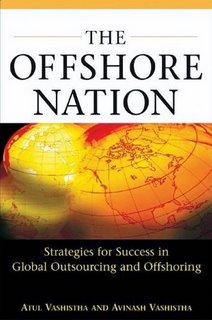 This book Offshore Nation: Strategies for Success in Global Outsourcing and Offshoring (McGraw-Hill, 2006) written by Atul and Avinash Vashistha is a must read for all those who want to maximize the benefits of business process outsourcing. As an avid observer of this emerging industry in the
This book Offshore Nation: Strategies for Success in Global Outsourcing and Offshoring (McGraw-Hill, 2006) written by Atul and Avinash Vashistha is a must read for all those who want to maximize the benefits of business process outsourcing. As an avid observer of this emerging industry in the Myth 1: that services globalization adds risk to business organizations. Not true, says the authors. “Offshoring can actually reduce the risk … by reducing your cost structure and diversifying your supply base to economies that are removed from the fluctuations of your home country economy and your core markets, and by providing access to a much larger labor pool.”
Myth 2: Offshore suppliers use slave labor. Reality: “The workforce is generally from the middle or even upper-middle classes of their respective countries… The delivery facilities in countries such as
Myth 3: The infrastructure is poor at offshore centers. Reality: “The IT parks in India, the Philippines, China, Hungary, Mexico, Ireland and other big offshoring locales rival those of Silicon Valley in terms of telecommunications, power generation and other infrastructure—and in many cases exceed them,” says the book.
This book’s quotation on Ernest Cu of SPI Technologies engaged in various outsourcing activities (eg. content editorial, production and electronic delivery; medical transcription; legal transcription; content aggregation; among others) here in
“One potential client came to us with some graphic needs and asked if our capacity can handle it? We have 35 g-series Macs, high-end four-color scanners, and handle at least 20,000 graphics a month. Can we handle it? I told him we can handle 10 times that.”
Outsourcing unaffected by Manila's political noise
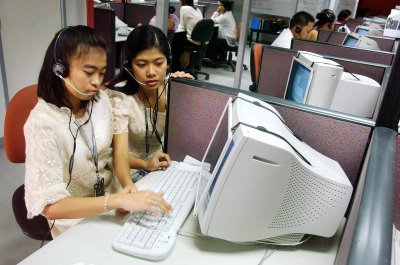 My impression was that the State of
My impression was that the State of “There was minimal impact…,” said NeoIT, in its recent report entitled Philippines: Impact of Current Political Developments on Offshore Outsourcing Industry. “Service delivery has been unaffected by these protest rallies… Power companies and telco providers continued to provide uninterrupted service throughout the country. Airports and seaports experienced normal operations as well.”
neoIT also said expansion plans of existing service providers are pushing through. Specifically, the operations of the ICT group in
Wednesday, March 22, 2006
Yahoo's booboo: Now i know why editors still have their places under the sun!
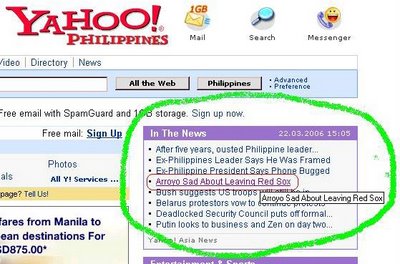
 The story "Arroyo sad about leaving Red Sox" in the March 22 edition of Yahoo Philippines (yes, the Philippines is interesting enough to merit a separate Yahoo page!) seems to tell us that President Gloria Macapagal Arroyo is in some way connected with the Red Sox, an American baseball team. Or is she a former fan of the Red Sox? Try clicking the headline and you will know that the story is not about President Arroyo but Bronson Arroyo, a baseball player, who is transferring to another team. Why this booboo? It's apparent that the one choosing the stories for Yahoo Philippines is a machine, a computer. My conclusion? Human editors are not yet obsolete, contrary to some observations that the journalism profession is going down the way of the dinosaurs. The machine simply doesn't have the subtle sensitivity to distinguish between Gloria the president and Bronson the baseball player. It's nice to know that we journalists still have our own place under the sun. For how long?
The story "Arroyo sad about leaving Red Sox" in the March 22 edition of Yahoo Philippines (yes, the Philippines is interesting enough to merit a separate Yahoo page!) seems to tell us that President Gloria Macapagal Arroyo is in some way connected with the Red Sox, an American baseball team. Or is she a former fan of the Red Sox? Try clicking the headline and you will know that the story is not about President Arroyo but Bronson Arroyo, a baseball player, who is transferring to another team. Why this booboo? It's apparent that the one choosing the stories for Yahoo Philippines is a machine, a computer. My conclusion? Human editors are not yet obsolete, contrary to some observations that the journalism profession is going down the way of the dinosaurs. The machine simply doesn't have the subtle sensitivity to distinguish between Gloria the president and Bronson the baseball player. It's nice to know that we journalists still have our own place under the sun. For how long?
Tuesday, March 21, 2006
Restricting skilled labor migration is absurd!
SUMMARY: “Labor is just like capital in a free market place. Investors will take their money to where it will get the best return. Workers will take their skill to where it will get the greatest reward… Thus the proposal that government ought to ban or in any way restrict the migration of aviators and aircraft mechanics is simply absurd and ridiculous,” says former Senator Ernesto Herrera. Please read the entire post.
It’s nice to know former senator Ernesto Herrera has taken the cudgels for overseas Filipino workers who are likely to be hit by the proposed travel ban or moratorium on skilled Filipino workers. In the recent employment summit, the Department of Labor and Employment (Dole) and the Philippine Overseas Employment Administration are contemplating of said measures supposedly in the name of “national interest” and “public welfare.” Senator Herrera calls these proposed policy “ridiculous” stressing that government “cannot effectively prevent Filipino pilots and aircraft maintenance engineers from leaving the country, should they decide to seek greener pastures abroad.”
Take the case of the International Container Terminal Services, Inc (ICTSI), a Filipino global ports management company. ICTSI operates a lot of ports here in the
There are a thousand and one ways to retain staff without resorting to coercive measures. The fear that only journalists will remain in this country if we open the floodgates to overseas jobs is understandable. The latest statistics say the current number mining engineers, geologists, and geodetic engineers would not be enough meet the demand for these skills in the next four years. The Dole blamed low labor supply on few tertiary schools offering said discipline and even fewer students who passed the board examinations. The reason for this trend is that in the last several decades, mining (prior to the Mining Act of 1995) were stagnant for lack of fresh investments. It’s only after the Supreme Court declared the constitutionality of the Mining Act that allows 100 foreign equity ownership (through the financial and technical assistance agreement) when the mining industry has started to hire more skilled professionals. Give it a few more years and soon smart kids will flock into this profession.
Ask Professor Eduardo Morato of the Asian Institute of Management about skilled labor migration and he will tell you that the real problem lies with local capitalists. Citing a recent survey by AIM in tandem with the Switzerland-based
Monday, March 20, 2006
Skilled Filipino workers of the world unite!
Government is thinking of employing coercive means to restrict OFW’s freedom to work abroad. Please read the rest of the post.
Government contemplates restrictions on overseas deployment of workers from "critical industries"
Sunday, March 19, 2006
Terrorists as heroes
 "People should not be afraid of their governments. Governments should be afraid of their people," says V (played by Hugo Weaving) in the film "V for Vendetta" (Warner Brothers), apparently paraphrasing political philoshoper John Locke. More so if such government has wronged the likes of V who is lethal with both the blade and the bomb.
"People should not be afraid of their governments. Governments should be afraid of their people," says V (played by Hugo Weaving) in the film "V for Vendetta" (Warner Brothers), apparently paraphrasing political philoshoper John Locke. More so if such government has wronged the likes of V who is lethal with both the blade and the bomb.Please see my full review of the film V for Vendetta in Without Borders: Films and Books.
Friday, March 17, 2006
SOS Blogger.com: Something funny is happening to my blog site
Thursday, March 16, 2006
Outsourcing is great but the farms and factories still matter
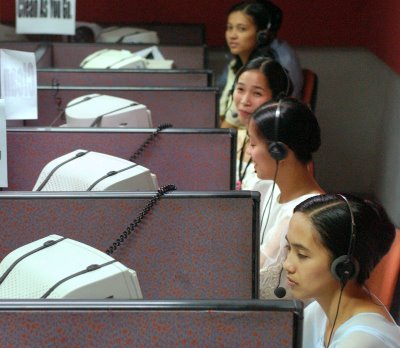
It seems like the services sector alone couldn’t yet lick poverty and joblessness in the Philippines, contrary to the assumptions of a service-sector driven growth strategy being peddled by economists from the academe. Producing more graduates with smooth American accents is cool but not enough. Please read the rest of the post.
They are there—those glamorous workers in business process outsourcing including call centers and medical transcription, information industry-enabled services and telecommunications who are transforming the urban landscape of Metro Manila and the secondary urban centers of
Wednesday, March 15, 2006
American Chamber of Commerce expresses “faith in the Philippines"
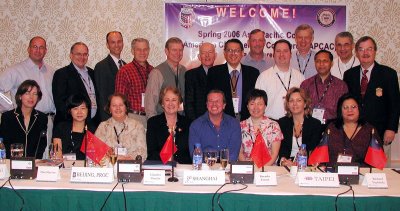 APCAC MEETS IN
APCAC MEETS IN Led by APCAC Chairman George Drysdale, Jr. (seated at the center), APCAC delegates discussed key policy issues to prepare for the June Washington Doorknock, APCAC’s annual meeting with US Government Leaders. Shown also in photo are the APCAC executive directors from L-R (Seating): Patricia Warman, Indonesia; Bo Kim and Tami Overby, Korea; Brenda Foster, China-Shanghai; Christy Chen, China-Tianjin; Judy Benn, Thailand; and Eloise Baza, Guam; (Standing) Tim Shaver, China-Guandong; Richard Vuylsteke, Taiwan; James Pogue, Okinawa, Japan; Charles Martin, China-Beijing; Donald Westmore, Japan; Robert Sears, Philippines; Ramesh Bajpai, India; Mike Hearn, New Zealand; Dominic Lavigne, Malaysia; Nicholas De Boursac, Singapore; A. Gafur, Bangladesh; Jack Maisano, Hong Kong; and Herb Cochran, Vietnam.
APCAC represents the interests of over 10,000 business entities in 26 countries of the region with $300 billion in investments.
Robert Sears, Amcham
“We have great faith in the
Tuesday, March 14, 2006
Cruel media
 Manila Times’
Manila Times’ (By the way, you may want to see my notes on Brokeback Mountain and V for Vendetta at Without Borders: Films and Books).
Monday, March 13, 2006
Americans went against their better selves to block the DP World Deal
American politicians went against the advice of their own thinking classes when they scuttled the DP Word deal. All along the conservative think tanks like the Heritage Foundation have stressing the UAE, or DP World for that matter, is not a threat to American society. Stresses James Jay Carafano, Ph.D, the foundation’s senior research fellow:
The UAE government is not a state-sponsor of terrorism, nor has any evidence been presented that Dubai Ports World has ever facilitated terrorist activities. In addition, Dubai Ports World is a holding company, and would have little to do with the day-to-day management of
Daniel Ikenson, trade policy analyst of the Cato Institute castigates politicians who blocked the deal, specifically Democratic senator (
To speak from a position of authority without understanding port security operations is reckless and misleading. Such demagoguery is worthy of stern rebuke, particularly considering the potential collateral damage caused by the hysteria.
The Bush Administration's
Sunday, March 12, 2006
Poison from the failed DP World Ports deal
In the
“…Dubai Ports World would not be in charge of security at the
Countries are currently trying to conclude the Doha Round of trade negotiations under the World Trade Organization. Now, Fortress Europe could now cite “national security” to block exports from developing countries.
(Note: Please visit Without Borders: Films and Books for my new blog on, what else?, films and books. Thanks.)
Thursday, March 09, 2006
Friendships without borders: a message from Ramya
I love Friday because it’s my day off and I don’t have to think about what’s happening in this world. I fact, I don't have to use my neurons at all. Friday is really about escape from the salt mines, a time for the family, the books, and movies. Sometimes, we really just hang out at Powerbooks Alabang for hours browsing possible good book buys. This morning though I got an email from a friend from
Imagine there's no heaven,
it's easy if you try,
no hell below us,
above us only sky.
Imagine all the people,
living for today yu-huh.
Imagine there's no countries,
it isn't hard to do,
nothing to kill or die for,
and no religion too.
Imagine all the people,
living life in peace yu-huh.
You may say I'm a dreamer
but I'm not the only one
I hope some day you'll join us,
and the world will be as one.
Imagine no possesions,
I wonder if you can,
no need for greed or hunger,
a brotherhood of man.
Imagine all the people,
sharing all the world yu-huh.
You may say I'm a dreamer ...
karma
Will blogs transform Philippine media?
Blogs have become so ubiquitous that it has captured the attention of mainstream media. Journalists and major news organizations are joining the bandwagon seeing the blog’s potential to reach a wider, more responsive audience. “Because access to the Internet is growing, blogs are potentially going to be a major source of information in the
“Blogs have the advantage of both print and broadcasting,” says Teodoro. If done properly, it can be speedy but not sacrifice accuracy. However, the former UP
The tension between public and private will continue to rage as technology churns out new forms of communication. Perhaps, for most Filipinos, the following post by Mindovervaginawonam sums up their blogging experience: “I am a writer at heart, a writer with an exhibitionist streak and hopefully not the other way around. I don’t come in search of friends or lovers or enemies. Everything here is carved to point towards things universal, where I am nothing but a speck of dust in. Writing is reaching out enough; comment boxes are the only things open.”
Blogging spawns “culture of self-disclosure”
 Try opening the www.mindovervagina.blogspot.com, scroll a few pages down to her
Try opening the www.mindovervagina.blogspot.com, scroll a few pages down to her If you are one of those who spend a lot of time online, reading these very personal, sometimes racy journals called ‘blogs’ and posting ones yourself, you are one of the growing millions of people out there who are hooked on blogging.
Academics call it mediated exhibitionism. Others call it empowerment and freedom of speech. Still others simply call it entertainment.
Media since the late 90s have been characterized by the continuous blurring of the boundaries between public and private. In television, this was evident in the popularity of talk shows and reality TV. What was deemed scandalous or inappropriate a decade before is now accepted and even expected in the name of free speech. This ‘culture of self-disclosure’ is especially showing up on the Internet.
“On personal home pages and message boards, in chat rooms and on listservs, and most especially in blogs, people are sharing unprecedented amounts of personal information with total strangers, potentially millions of them,” says
Exhibitionist’s world
“Blogging has given the ‘average people’ the ability to communicate and publish their work, without having to face publishers and editors,” said Melissa Atienza-Petri (www.pinayexpat.com), a Filipina expatriate working as mathematical analyst for a high tech firm in
“Oh yes, I also exhibit myself, not new. I’ve crossed my exhibitionist barrier in Yahoo Messenger where I strip for lots of random people. Lately, I’ve penetrated Pinoys and Pinays like me who are also offering whatever it is I’m offering, and have actually encountered someone I know. Should I be open with my life or is that living dangerously? Now that I have a community? Pinoys aren’t Pinoys unless they reach out in a personal way with their hearths and hearts,” says Mindovervaginawoman in her
“You blog because you want people to read what you post. Otherwise, why blog at all?” says Vlad, an avid blogger who maintains several sites including www.awbholdings.com/blog for his thoughts on technology and politics. Like the rest of the world, Filipinos are flocking towards blogs as a new way of expressing themselves and connecting with other people.
Voyeur’s delight
Related post
Wednesday, March 08, 2006
Foreign ownership restrictions constrain ICT growth in developing countries
 Poor countries including the
Poor countries including the “In 1980, developing countries accounted for only 20 percent of the world's telephone lines. In 2005, 60 percent of the world's phones were in developing countries. Such expansion has been driven by the technological revolution of mobile telephony as well as private competition,” said the WB Report.
The WB report, however, has noted that these gains in ICT have largely benefited a limited number of people.
“Although progress has been made reaching out rural areas and the urban poor, in many countries, these groups still lag behind,” said the WB report. “And the advanced information and communication services available through the Internet initially reach mainly better off groups.”
In the
“While the developing world has seen huge progress in rollout of basic ICT infrastructure, the picture is more mixed for advanced use of ICT,” said the WB Report. “Worldwide, Internet use more than quadrupled between 2000 and 2005, but differences in the number of secure Internet servers, a proxy for the availability of e-commerce, remain stark. While developed nations have more than 300 such servers per 1 million people, developing nations have fewer than 2.”
Extending the reach of ICT to the broader segments of the population, the WB report argues, could boost economic growth and address poverty in developing countries by creating more growth opportunities for the private sector. Citing it’s survey of 56 developing countries including the
The first step to boost the growth of the ICT sector and take advantages of this economic benefit, the WB Report said, is to allow the markets to work complemented by regulatory measures such as open entry, cost-based pricing, access to infrastructure and access to radio spectrum.
“Competitive, private-led markets go a long way toward making communication and information services available to the entire population,” the WB report said.
Worse than Proclamation 1017: government contemplates restricting overseas deployment of workers from "critical industries"
After curtailing our basic rights of peaceful assembly, freedom of expression, and freedom of the press under Proclamation 1017, the Arroyo Administration is again contemplating about curving the people’s other basic rights including our rights to travel, to find gainful employment, and pursue our own happiness. For amidst the hysteria generated by the “State of Emergency,” no less than the Philippine Overseas Employment Administration—the agency tasked to look after the interest of overseas Filipino Workers—has announced On March 2 that the government is formulating a strategy of “determining critical skills” or an inventory of industries that are losing skilled labor because of overseas deployment. This is a terrible irony because overseas workers are supposedly the "new heroes" in this country.
But what about the industries that will be affected once the workers left for foreign shores? Surely this is a valid concern but putting restrictions on people’s work mobility is the wrong way to go. This is because governments are lousy at determining labor supply and demand. Government bureaucrats could conduct an inventory of labor requirements at the industry level but such information is never adequate to represent the dynamics of labor supply and demand.
The idea that “critical workers” should be "kept domestically" before they leave “to allow the local market to make up for their loss” is preposterous. In truth, such measures will only provide more distortions in the labor market, the reason why more workers are leaving in the first place. Instead, the best way to ensure adequate supply of skilled workers in certain industries is to allow the labor market to work. The government could only compliment this process through continuous workers training. Better yet, industries like aviation might as well provide in-house training and raise their staff’s pay commensurate to their skills acquired.
Don’t blame the nurses for the medical crisis